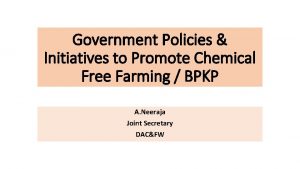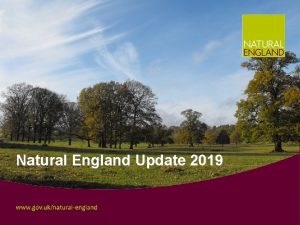Research Initiatives and Future Strategies to promote Natural




















- Slides: 20

Research Initiatives and Future Strategies to promote Natural Farming-BPKP DARE - ICAR

Forms of Bharatiya Prakritik Krishi Paddhati (BPKP) 1. Organic farming / Jaivik Kheti / Jaivik Krishi • Avoiding or largely excluding synthetics in farming • Meets International Standards • 1. 6 % area of net cultivated area (2020) to 4 % by 2025 • Rs 4500 crores worth products are exported 2. Natural farming • Use of locally prepared cow based products (Beejamrit, Jeevamrit, Ghanjeevamrit & others), Acchdhana, Whapasa and intercropping • Jeevamrit to ensure high soil biological activity • Recycling of biomass, diversified crop stand, cattle urine and slurry

Forms of Bharatiya Prakritik Krishi Paddhati (BPKP) 4. Rishi krishi • Drawn from Vedas • 15 kg/ha of virgin rhizopheric soil from banyan tree • Amritpani (ghee, cowdung, honey, water) and virgin soil • Beej sanskar (seed treatment), Bhumi sanskar (soil application) and Padap sanskar (foliar spray) 5. Panchagavya krishi • Prepared from five products of cow: dung, urine, milk, curd and ghee • Enrichment of soil, induce plant vigour with quality production 6. Natueco farming • Neighborhood Resource Enrichment' by `Additive Regeneration' rather than through dependence on external, commercial inputs. • Soil – Enrichment, Roots - Development Chickpea Urdbean Mungbean Pigeonpea Sesame Horsegram Sword bean Ragi

Forms of Bharatiya Prakritik Krishi Paddhati (BPKP) 7. Homa farming • You heal the atmosphere, and the healed atmosphere will heal you • Spiritual practice that dates from the Vedic period • Ash that results from the puja is used to energise composts, plants, animals etc 8. Permaculture / eco-agriculture • Agro-ecological principles • Earthworm and soil bio-diversity development • Sustainability “Science led promotion of different forms of BPKP (Natural Farming) including Organic Farming is essential”

ICAR-All India Network Programme on Organic Farming (AINPOF) • • • 2003 -04 (13 centres) 2015 -16 (20 centres) 16 states 11 SAU’s 7 ICAR institutes 1 Special Heritage University • 10 ACZ’s • 12 AERs Proposed to be upgraded in the next SFC • AICRP on Organic and Natural Farming • 35 centres including 8 out-reach centres • 24 States • 17 SAUs, 8 ICAR institutes, 1 CAU & 3 other

Achievements of AI-NPOF • Characterizedmicrobes from indigenous preparations (Shasyagavya, Panchagavya, Kunapajala, Ghanjeevamrit & Jeevamrit) • Evaluated different forms of BPKP (Panchagavya & biodynamic Krishi, Natural farming study in progress) • Characterized with geo- • Yield gap of 30 major crops analysed • Yield gap: ranged from 4 % in Garlic to 50 % in mustard

Characterization of Natural farming Inputs a. Free living N fixers b. P-SBs c. K-SBs Bacillus arvabhattai Peudomonas protegens Aeromonas salmonicida Ochrobactrum haematophilum Bacillus subtilis Pseudomonas azotoformans Bacillus cereus Pseudomonas aeruginosa Bacillus paramycoides Bacillus cereus Bacillus circulans

Evaluation of Natural Farming Concoctions Change in yield under NF over established management packages (4 locations)

Andhra Pradesh (Vizianagarm) • 30 each SPNF and Conventional farmers (study undertaken through OFR centre, AICRP-IFS at ANGRAU Particulars Cost of cultivation (Rs. ) Rice yield (kg /ha) Gross Returns(Rs. ) B C Ratio Conventional Farming 39149 5926 86613 2. 22 SPNF 47991 4835 81331 1. 70 Percentage deviation + 22. 58 % -18. 41 % -6. 09 % -23. 42 %

Identification of varieties for Organic Production System • Cereals: Coarse rice, basmati rice, durum wheat, maize • Pulses : chickpea • Oilseeds: Groundnut, mustard, soybean • Vegetables: Tomato, pea, okra, cauliflower, french bean • Spices: Turmeric. Yield : 3. 7 t/ha Yield : 17. 5 t/ha Yield : 5. 3 t/ha

Achievements of AI-NPOF • Developed Po. Ps for organic production of 51 cropping systems suitable to 12 States. • 28 cropping systems/crops in 3 states through Po. Ps developed by the respective institutes /SAUs documented. • 7 Integrated Organic Farming System models established in 6 States. About 80 % of inputs can be generated within the farm thus reducing the cost significantly. • Uploaded in DAC website for use through PKVY and MOVCD-NEH schemes. • 74 Certified Farm Advisors on Organic Farming from 18 States trained in collaboration with MANAGE.

y t men y o l Emp an days m 236 Total Input (Rs) 108800 Tota l out pu 2181 t (Rs) 60 nput i y g r l ene 3 MJ a t o T x 10 25. 8 Net Return Rs. 1, 09, 360 Ne Sy st e (R m P s/ ro da f y) ita 29 bil 9 it Crops + Horticulture + Livestock t 73 ene. 4 rg x y 1 0 ou 3 M tpu J t IOFS model of 0. 5 ha (Sikkim) Timpyem (44 HH) & Nandek (228 HH) in East Sikkim Manure production (FYM) (6. 3 t) Vermicompost (3. 1 t) B: C Ratio 2. 03 80% of inputs requirement can be produced on-farm through IOFS

Creation of organic farming clusters • Organic Farming cluster established in 3 States Meghalaya (Mynsain), Tamil Nadu (Manar) and Sikkim (Timpyem & Nandek) • Sale outlet created in the National Highway in Meghalaya • Manar Vanadesa Organic farmers’ association formed in Tamil Nadu.

Technological backstopping for MOVCD-NER (12 -14 May 2020) Around 1 lakh farmers having 70, 000 ha area have been federated into 130 FPOs under MOVCD-NER Demonstration clusters of organic farming developed by ICAR under AI-NPOF shall be utilized by FPOs for capacity building and to stimulate behavioral change in farmers for on-farm input generation. New clusters could be developed in FPOs if funding is provided.

Research initiatives on BPKP-Natural Farming (from kharif 2020) 1. Geo-tagged survey from natural farming farmers field (16 States) 2. Detailed characterization of inputs (Jeevamrit, Ghanjeevamrit, Beejamrit, Agniastra, Neemaster, Brahmaster) at selected locations (Narendrapur, Coimbatore, Udaipur, Ludhiana and Calicut) 3. Evaluation of Natural Farming Practices in different agro-ecology” (19 locations in 15 States) 4. Addition of natural farming inputs in the existing long-term experiment on comparative evaluation of different production systems (20 locations in 16 States) 5. Validation of natural farming practices in farmers’ field under SCSP / STC sub plans (7 locations in 7 States) Natural Farming (Ludhiana) ICM with pest management through NF inputs

Multi-location study on Natural Farming (from kharif 2020) Cropping system (8) Number of State / UT Maize +cowpea (fodder) ( 1: 1) at 60 cm- wheat + chickpea (1: 1) Cotton (MCU-13) +green gram (DGGV 2) (1: 1) at 60 cm-- rabi sorghum +chickpea (1: 1) at 45 cm. Soybean +maize (4: 1) at 30 and 60 cm - wheat+mustard (8: 2) at 22. 5 cm. Rice +dhaincha --maize+cowpea (fodder) Turmeric + cowpea (1: 1)—green gram Cassava +vegetable cowpea (1: 1) at 90 X 90 cm - greengram Cowpea + maize (fodder) (4: 2)— fennel+cabbage (2: 1) Soybean+maize for grain (2: 1)— Uttar Pradesh, Punjab & Uttarakhand Karnataka & Tamil Nadu locations 3 2 Chhattisgarh & Madhya Pradesh 3 Jharkhand Maharashtra Kerala and Meghalaya 2 Kerala 1 Gujarat & Rajasthan 3 Himachal Pradesh, Sikkim 3 2

Detailed characterization of inputs (Jeevamrit, Ghanjeevamrit, Beejamrit, Agniastra, Neemaster, Brahmaster) Source of ingredient Material Native breed cow Holstein Friesian cow 2020 -21 Urine and dung (NB) Urine and dung (HF) NF inputs to be prepared Beejamrit = 3 types Ghanjeevamrit = 3 types Mixed urine and dung Jeevamrit = 3 types of Native and HF breeds (Mixed) Characterization: 9 treatments X 3 replications = 27 samples Individual ingredient and also final product should be characterized 2021 -22 Characterization of other inputs such as Agniaster, Neemaster and Brahmaster

Future Strategies • Upgradation of AI-NPOF to AICRP on Organic and Natural Farming • Characterization, validation and refinement of indigenous technical knowledge and preparations • Development of resource specific Po. Ps for BPKP • Re-designing of existing package for improving the yield of rabi crops • Technologies / packages for improving the yield of crops during conversion period especially in high input areas • Assessment of social impact of organic farming promoted in niche areas • National Digital Repository on BPKP • PG Research Fellowship on BPKP through research scheme (AICRP on ONF) • Skill and entrepreneurship development for rural youth and farmers

Committee Constituted for “Empirically Validating the Results of SPNF Model” Terms of Reference • Review the research results of SPNF (earlier known as ZBNF) work carried out at different Institutions of State Agricultural Universities, ICAR Institutes and also under All India Network Programme on Organic Farming and make suitable recommendations on SPNF including future research strategies. • Examination of merits and demerits of Subhash Palekar Natural Farming (SPNF) practices through field visit and stakeholder interactions to suggest measures for validation of results at research farms and in farmers’ field. • Examine the expected impact of promoting SPNF in large scale on soil health, productivity, food production, livelihood and sustainability of agriculture in India. • Make suitable suggestions for converging the scientific organic farming practices of SPNF. Committee collected thewith data that / information from various States with the involvement of all stake holders. Report finalization is under progress

Thank You
 Active learning strategies to promote critical thinking
Active learning strategies to promote critical thinking Active learning strategies to promote critical thinking
Active learning strategies to promote critical thinking Exercise future continuous and future perfect
Exercise future continuous and future perfect Future perfect future continuous future perfect continuous
Future perfect future continuous future perfect continuous Implement tasks that promote reasoning and problem solving
Implement tasks that promote reasoning and problem solving What is community meal
What is community meal To promote personal growth and leadership fccla
To promote personal growth and leadership fccla The three r's in membership fccla
The three r's in membership fccla Protect, promote, and improve the health of all people
Protect, promote, and improve the health of all people Delvic sanitation initiatives
Delvic sanitation initiatives Digital initiatives in higher education
Digital initiatives in higher education Crm marketing initiatives
Crm marketing initiatives Max scheler empathy theory
Max scheler empathy theory Business development initiatives
Business development initiatives People's initiatives
People's initiatives It software management initiatives
It software management initiatives Health initiatives
Health initiatives Help desk improvement plan
Help desk improvement plan Us soccer player development initiatives
Us soccer player development initiatives Global health initiatives meaning
Global health initiatives meaning Work-life balance presentation
Work-life balance presentation







































